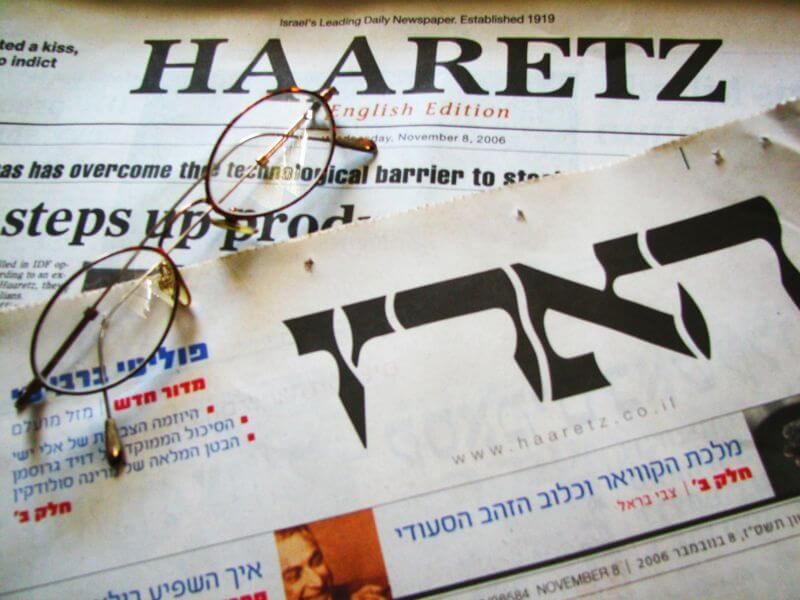Love them or hate them, the news industry needs anonymous sources. Sometimes, the information they provide can’t be obtained from anywhere else.
I get that.
But journalists must use nameless sources with caution. They make news less transparent — readers have to place a lot more trust in the reporter that the source is credible, is in a position to know what he’s speaking about, and isn’t using the paper for his own agenda. That’s why most news services have guidelines for anonymity. Two in particular warrant mentioning now.
- Reports must contain at least one identified source. No story should be pegged entirely on anonymous figures.
- While it is appropriate to quote an anonymous source providing information, care must be given when he provides an opinion or interpretation of facts. It is certainly unethical to allow a source to attack someone from behind a shield of anonymity.
Which brings us to “senior administration officials in Washington” who briefed Haaretz.
Senior administration officials in Washington said on Wednesday they had reached the conclusion that Prime Minister Benjamin Netanyahu was not interested in any nuclear arrangement with Iran – except for one in which Tehran completely capitulates but is denied sanctions relief in return.
“That is the logic of Israel’s criticism,” they said in a briefing with Haaretz . . .
The officials expressed both dismay and disappointment at the fact that Netanyahu and other Israeli opponents of the Iran deal did not find anything positive in the Vienna agreement – even though many Israeli positions had been incorporated in the final document. The officials noted that the agreement also met the “red lines” that Netanyahu himself had drawn during the past few years – “and then some.”
Under such circumstances, they added, “It’s hard to have reasoned discussions” with Israel.
 On it’s own, this briefing should not have been published as is. Due diligence on Haaretz’s part would mean finding someone in Washington willing to talk on record, and right of response from Jerusalem. In the absence of that, this briefing should’ve been filed away as background info for the Haaretz staff.
On it’s own, this briefing should not have been published as is. Due diligence on Haaretz’s part would mean finding someone in Washington willing to talk on record, and right of response from Jerusalem. In the absence of that, this briefing should’ve been filed away as background info for the Haaretz staff.
Due diligence on Haaretz’s part would also mean questioning these anonymous officials. Israel doesn’t prefer war. Israelis neither seek nor expect Iran’s utter capitulation. And despite the “best deal we could get” talking points, there was an alternative. Here’s what a good Iran deal would look like.
Our “senior administration officials in Washington” trying to discredit Israeli concerns while plugging the Iran deal chose well in Haaretz. Recent staff editorials have called the deal “an incredible diplomatic achievement,” while dismissing Prime Minister Netanyahu’s objections as “hysteria.”
That’s out of touch with the Israeli mainstream. Israeli public opinion polls have found 71 percent believe the deal brings Iran closer to a nuclear bomb, 51 percent would bypass Obama to defeat the accord, and 47 percent support independent Israeli military action against Iran.
So when coming across an unidentified source, here are six questions to ask yourself:
- Who is the source?
- Is he really in a position to know what he claims? Has the reporter provided enough background info on the source to help us make our own judgment?
- Why can’t he be identified for the story? Are readers given a plausible explanation?
- What are the source’s possible motives for speaking to the reporter?
- Is he fudging anything?
- Could the info have been obtained on the record from somewhere else?
If the US wants to win over Israeli public opinion, it will have to engage Israelis with “reasoned discussion,’ and buck up about the fact that Israelis beyond the Haaretz bubble aren’t saying nice things about the agreement. Anonymous mud-slinging in an out-of-step newspaper won’t cut it.
Featured image: CC BY flickr/Zaheer Mohiuddin with modifications by HonestReporting; newspapers CC BY Wikimedia Commons/Hmbr;

